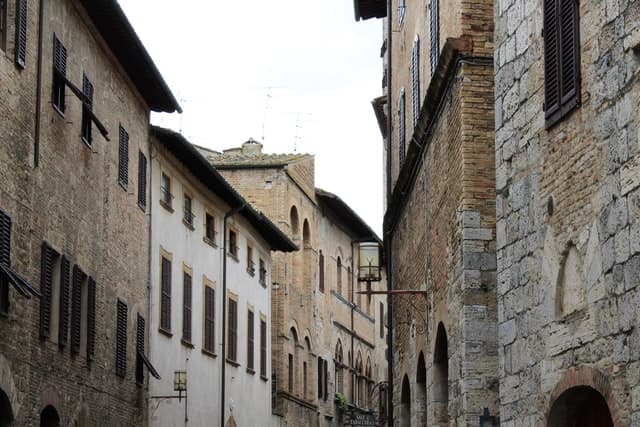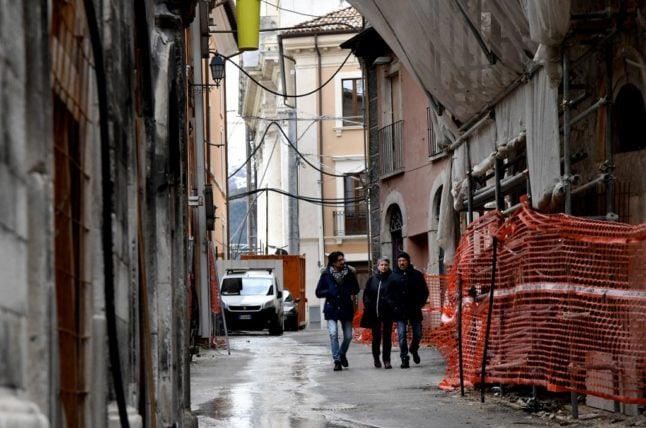Six things you need to know about claiming Italy's 'Sismabonus'

If you're planning to renovate a property in Italy, you may know there's government funding available for earthquake-proofing. But how do you access it? Here's a look at how the 'Sismabonus' works.
The name ‘Sismabonus’ might not be new to you. In fact, how could it be? The fabled Italian property bonus has been the focus of national and international media attention for some time now.
Italy has extended the Sismabonus scheme until 2024, so there’s still time to claim funding towards protecting your property from possible earthquake damage.
READ ALSO: Italy’s building bonuses: Can you really claim back the cost of renovating property?
But the typically muddy waters of Italian bureaucracy, coupled with the widespread lack of information available in English, have so far made it fairly hard (to say the least) for non-Italian-speakers to understand much about claiming the touted funds.
So, in the hope of providing some clarity on the Sismabonus, here are six things that you absolutely need to know about it.
What is it?
In a nutshell, the Sismabonus is a government-funded incentive that offers generous tax concessions to those who carry out works aimed at "seismic adaptation", "seismic improvement" or "anti-seismic renovation" on properties located in areas at risk of experiencing earthquakes (see more about the zones below).
First introduced in January 2017, this bonus is part of a package of economic incentives encouraging investment in construction and renovation work across Italy.
READ ALSO: The red flags to watch out for when buying an old house in Italy
As the name suggests, the bonus was created by the Italian government to tackle the endemic seismic vulnerability of many buildings across the nation.
The goal is to prepare the most at-risk areas of the country for possible seismic events. On this note, let us not forget the terrible earthquake that all but destroyed L’Aquila, Abruzzo’s capital, in 2009.

A photo from 2018 shows ongoing reconstruction efforts in L'Aquila following the 2009 earthquake. Photo by TIZIANA FABI / AFP
Who can claim it?
The bonus can be claimed by both Irpef and Ires taxpayers (i.e. both private citizens and companies) so long as they are the owners of the property in question and that they are the ones undertaking (and thus paying for) the construction works.
Foreign nationals are as entitled to the bonus as Italian nationals are - provided, of course, that they meet the above criteria.
How much can I claim?
The amount you can claim depends on the type of work you carry out. Those who complete regular anti-seismic renovation work are entitled to a 50 percent tax deduction which must be calculated on a maximum expenditure of €96,000 for each building unit.
The deduction is usually divided into five equal yearly instalments, meaning your Irpef or Ires tax bill will be lowered over that period.
READ ALSO: How Italy’s building ‘superbonus’ has changed in 2022
The amount you can claim significantly increases if the completed works reduce the seismic vulnerability of the property by one grade (70 percent deduction) or two grades (80 percent deduction).
Where can I claim?
If you're renovating a building anywhere in Italy, its stability in the face of an earthquake is one of the things you'll have to consider. But of course, some areas are more prone to seismic activity than others, and the Sismabonus reflects that.
The bonus can only be claimed for work on buildings located in seismic areas 1 (high seismic risk), 2 (medium risk) or 3 (low risk). Buildings located in zone 4 (very low risk) are excluded.
A very detailed breakdown of Italy's seismic areas is available here. This website does not have an English version but typing the name of your comune in the webpage search tool (commando + F for Mac users) will help you find its seismic classification in no time.
READ ALSO: How to stay out of trouble when renovating your Italian property

Photo by TIZIANA FABI / AFP
How do I claim it?
Alas, here comes the tricky bit.
The individual or company undertaking the construction works will need to provide a series of documents to the Agenzia delle Entrate (Italian Revenue Agency). These include: documents detailing the type of work being carried out and the date of its start, proof of ownership of the property and all the invoices received from the relevant building companies. Your project’s geometra (surveyor) should be able to help you obtain and submit the correct documentation.
Once all the required documentation is submitted to the Agenzia delle Entrate, all that’s left to do is to select the most suitable payment method. There are three options: tax deductions, credit or invoice discounts.
How much time do I have to carry out the work?
Some good news here: Earlier this year, the incentive’s deadline was extended to December 31st, 2024. You have until then to carry out the relevant work on your property and claim the corresponding tax deductions.
Useful resources:
For the most accurate advice on your planned renovation project and the paperwork involved in claiming tax deductions, it is important to speak to a qualified Italian building surveyor or engineer.
Online, you may find relevant information on the subject is scant and often unclear, especially for English speakers.
The most detailed information is available on the Agenzia delle Entrate’s website (available here). Again, unfortunately, there’s no English-language version, which means that you might have to rely on Google Translator’s boundless AI talent.
For more details, you can also get in touch with the Agenzia delle Entrate directly. Find contact information here.
See more in The Local’s Italian property section.
Comments
See Also
The name ‘Sismabonus’ might not be new to you. In fact, how could it be? The fabled Italian property bonus has been the focus of national and international media attention for some time now.
Italy has extended the Sismabonus scheme until 2024, so there’s still time to claim funding towards protecting your property from possible earthquake damage.
READ ALSO: Italy’s building bonuses: Can you really claim back the cost of renovating property?
But the typically muddy waters of Italian bureaucracy, coupled with the widespread lack of information available in English, have so far made it fairly hard (to say the least) for non-Italian-speakers to understand much about claiming the touted funds.
So, in the hope of providing some clarity on the Sismabonus, here are six things that you absolutely need to know about it.
What is it?
In a nutshell, the Sismabonus is a government-funded incentive that offers generous tax concessions to those who carry out works aimed at "seismic adaptation", "seismic improvement" or "anti-seismic renovation" on properties located in areas at risk of experiencing earthquakes (see more about the zones below).
First introduced in January 2017, this bonus is part of a package of economic incentives encouraging investment in construction and renovation work across Italy.
READ ALSO: The red flags to watch out for when buying an old house in Italy
As the name suggests, the bonus was created by the Italian government to tackle the endemic seismic vulnerability of many buildings across the nation.
The goal is to prepare the most at-risk areas of the country for possible seismic events. On this note, let us not forget the terrible earthquake that all but destroyed L’Aquila, Abruzzo’s capital, in 2009.

Who can claim it?
The bonus can be claimed by both Irpef and Ires taxpayers (i.e. both private citizens and companies) so long as they are the owners of the property in question and that they are the ones undertaking (and thus paying for) the construction works.
Foreign nationals are as entitled to the bonus as Italian nationals are - provided, of course, that they meet the above criteria.
How much can I claim?
The amount you can claim depends on the type of work you carry out. Those who complete regular anti-seismic renovation work are entitled to a 50 percent tax deduction which must be calculated on a maximum expenditure of €96,000 for each building unit.
The deduction is usually divided into five equal yearly instalments, meaning your Irpef or Ires tax bill will be lowered over that period.
READ ALSO: How Italy’s building ‘superbonus’ has changed in 2022
The amount you can claim significantly increases if the completed works reduce the seismic vulnerability of the property by one grade (70 percent deduction) or two grades (80 percent deduction).
Where can I claim?
If you're renovating a building anywhere in Italy, its stability in the face of an earthquake is one of the things you'll have to consider. But of course, some areas are more prone to seismic activity than others, and the Sismabonus reflects that.
The bonus can only be claimed for work on buildings located in seismic areas 1 (high seismic risk), 2 (medium risk) or 3 (low risk). Buildings located in zone 4 (very low risk) are excluded.
A very detailed breakdown of Italy's seismic areas is available here. This website does not have an English version but typing the name of your comune in the webpage search tool (commando + F for Mac users) will help you find its seismic classification in no time.
READ ALSO: How to stay out of trouble when renovating your Italian property

How do I claim it?
Alas, here comes the tricky bit.
The individual or company undertaking the construction works will need to provide a series of documents to the Agenzia delle Entrate (Italian Revenue Agency). These include: documents detailing the type of work being carried out and the date of its start, proof of ownership of the property and all the invoices received from the relevant building companies. Your project’s geometra (surveyor) should be able to help you obtain and submit the correct documentation.
Once all the required documentation is submitted to the Agenzia delle Entrate, all that’s left to do is to select the most suitable payment method. There are three options: tax deductions, credit or invoice discounts.
How much time do I have to carry out the work?
Some good news here: Earlier this year, the incentive’s deadline was extended to December 31st, 2024. You have until then to carry out the relevant work on your property and claim the corresponding tax deductions.
Useful resources:
For the most accurate advice on your planned renovation project and the paperwork involved in claiming tax deductions, it is important to speak to a qualified Italian building surveyor or engineer.
Online, you may find relevant information on the subject is scant and often unclear, especially for English speakers.
The most detailed information is available on the Agenzia delle Entrate’s website (available here). Again, unfortunately, there’s no English-language version, which means that you might have to rely on Google Translator’s boundless AI talent.
For more details, you can also get in touch with the Agenzia delle Entrate directly. Find contact information here.
See more in The Local’s Italian property section.
Join the conversation in our comments section below. Share your own views and experience and if you have a question or suggestion for our journalists then email us at [email protected].
Please keep comments civil, constructive and on topic – and make sure to read our terms of use before getting involved.
Please log in here to leave a comment.